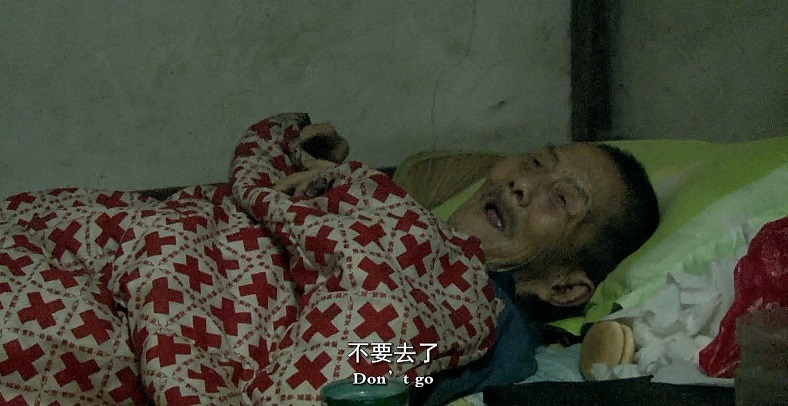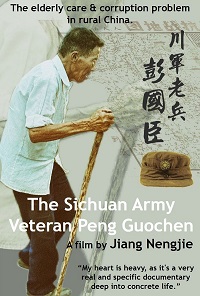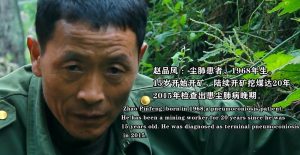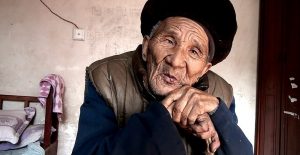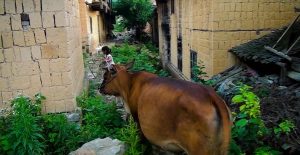Last Updated on January 16, 2021
There is no need for meat-eaters to pay insincere visits to war veterans! What is needed is for the government and public servants to really care about and help the elderly and families who are in trouble. Since we are a socialist country, you should fulfill the responsibility you have promised to the people!
Hao Yi
We translate local audiences’ reviews about issues presented in the film into English when possible. In this way, you can take a look at what local people think about these issues and have in-depth understanding about them. The number besides the reviewer represents how many upvotes a comment/review has received.
Warning: spoilers may apply. To ensure the best viewing experience, we suggest that you watch The Sichuan Army Veteran Peng Guochen first and subscribe now for 20% OFF.
The documentary frequently uses off-screen voice. With the sweet voice of the host broadcasting various news about the country’s wealth and people’s strength, the camera always focuses on Peng Guochen’s wrinkled and expressionless face. This combination of sounds and pictures is not necessarily brilliant.
However, the sharp contrast between the off-screen voice and the content in the shot still makes people think about the significance of the existence of independent documentaries in today’s film market: It touches a gap that the mainstream media cannot take care of, through which you can look down and know that it’s so deep and dark.
-Li Meng Lemon (8)
Where is the money? You dare to be greedy and cheat on the money for such old people. You say you pay a visit to express express sympathy and solicitude but stay less than a minute and then leave. What kind of people you are?
-tuzi (4)
Without a few minutes’ recollection of a magnificent or displaced life, it quickly becomes a merciless look at the agony of dying. Of course, there is always a warm observation behind the camera. Even those moments of mutual abuse in front of the camera can be fully understood and forgiven by the audience because this is the reality of a community with a shared future for society and mankind.
The problem of elderly care in rural China has also been revealed. As for solution, it is not the responsibility and ability of the documentary filmmaker. In the era when everyone is living a good life but still being repeatedly squeezed or cheated without knowing the truth, don’t think that these lonely old people in Shaoyang countryside are individuals who have nothing to do with you. It might be more effective than a horror movie to let yourself be scared about the future.
-seamouse (3)
I believe that most people who have ever lived in rural areas or have a basic understanding of national conditions can more or less see some familiar situations in the film. I was moved by Songbai’s insistence on his grandfather. Perhaps abandoning grandpa would have been a good deal for him and his family, but it’s the kind of never-leaving and carefulness that is admirable. At the beginning, I thought it was a well-off family, and then gradually realized the hardship of having nothing. I almost burst into tears when it finally got a close-up of the whole bungalow.
-JOMO (3)
It touches on corruption in “poverty alleviation”. It seems that the people who know China best are the people themselves.
-Jing Zhi De Liu Shui (3)
Only when the old are nourished can the world be united. The country’s social security system is not perfect, low-level officials have no conscience, and formalism is more than visiting significance. If we forget the heroes, what else can we remember?
-Wang Zhao Xin (3)
Realistic subject matter under the surface of old soldier. I see the desolation of old age. What’s good about being a hundred years old? The grandnephew is already very filial.
-Zheng Ge Ba Yue (2)
It’s quite raw, and it’s so true that it’s even a bit depressing. Although his identity is the Sichuan army war veteran, but he is just an ordinary rural elderly. Their most youthful and passionate times were buried by history, and their declining years were corroded by real life.
-Kong Fu Xiao Yu (1)
It is ironic that countryside broadcasting be juxtaposed with the reality of a veteran’s old age.
-Yi Sheng Tan Xi (1)
The director takes time as the foundation and death as the ending. His style of contrasting the broadcasting with the reality from time to time is very realistic. The veteran’s tragedy is a matter of history. It is the problem of people fighting with each other as the result of the Kuomintang’s defeat.
It is hard to imagine the tragedy of his life: being criticized and denounced publicly during the cultural revolution, the childlessness of old age, and the exploitation of subsistence allowances. But luckily he has a grandnephew. And what will happen to other old people who are in the same situation as him? I can’t imagine.
-Mu Xi Zhi Zhi (1)
There is no need for meat-eaters to pay insincere visits to war veterans! What is needed is for the government and public servants to really care about and help the elderly and families who are in trouble. Since we are a socialist country, you should fulfill the responsibility you have promised to the people!
-Hao Yi
Like many veterans of the National Revolutionary Army, Peng Guochen is also ignored and given poor welfare. In the end, the money for targeted poverty alleviation ends up in the poverty relief office. Less than a minute’s visit from the county’s committee is more like a political catwalk. The repeated broadcast of targeted poverty alleviation stands in sharp contrast to the actual implementation.
The 70 anniversary celebration on TV is full of scenery, which reflects the miserable life of the old man. Since the victory of the war of resistance against Japan, the veterans have been liquidated and marginalized. In addition to preferential treatment, what they need more is attention from the state and recognition from the society.
-Er Shi Yi Qiang
In fact, it is the miserable old age of ordinary old people, which makes people see the absence of the government in elderly care. Like most families, they rely on their children and grandchildren to support them. It is hard to avoid the situation of “no filial long illness”. Just the status of a nearly century-old veteran of the Sichuan army makes it particularly bleak. They paid their youth for the country, but spent a life without quality alone due to their identity of the National Revolutionary Army. It’s more than miserable old age. It’s a miserable life.
-Jin Wu Du
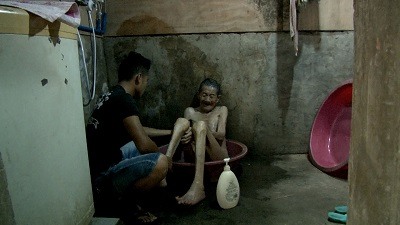
The grey second half of the life of ordinary old people in the countryside. The grandnephew has done his best to be filial. But if poverty, the root of the pain, is not addressed, and corruption is not addressed, all will be repeated.
-Xia Se Nuan Feng
As a veteran of the war of resistance against Japanese aggression, he is bedridden and has no money for medical treatment. What is the taste of him watching the parade of the 70th anniversary of the war of resistance against Japanese aggression on TV?
-Chou Si Ben Tu Zi
There are a lot of vanity projects and behaviors of complying in pubic but opposing in private in the government’s poverty alleviation policies. Those fat-headed and mouse-eared government officials have taken away these old people’s money, leaving them with nothing for medical treatment and a better life. In a practical sense, this part is stimulating enough. Documentary’s function of discovering and presenting problems is particularly important under the soil of China.
-LoudCrazyHeart
Empathy may only exist in people who are in the same situation. Perhaps it can only rely on a philosophical level of “filial piety” to let the younger generation understand the old generation, and the healthy people understand the sick. Whether at the family or social level, people attach importance to the decency of funerals to let everyone know that they are filial piety and moral.
Of course, the grandnephew in the documentary did a great job. It also shows that the really common feelings on the elderly care is the coexistence of love and boredom. In terms of authenticity, it is much better than those who are perfect, and it also makes the audience reflect on themselves (hopefully). We also hope that those responsible for poverty alleviation will not be blinded by money.
-Fan Fan
Targeted poverty alleviation is a derogatory term and a joke…
-Fan Shi Kan Yuan Jie Bei Shang
It’s clearly not just an elderly-care issue, but the constant tragedy of goodness always being let down.
-Mei Kai
When I saw the last scene, I really burst into tears. Saying more is useless and helpless. The elder-care problem is too heavy.
-Tobi
After watching it, I was wondering what to do when I get old. Think for a long time, I may be in a nursing home!
-Vindon
Things that are not experienced in our time are actually happening in our time. Hope we can record something.
-WKEREN
A very realistic documentary. It exposes the problems existing in the social bureaucracy. All beings are suffering and helpless. Thank you to director Jiang Nengjie for recording this.
-A Lu Qi Nian
The story of my hometown. If it is shown to folks who see off the old in the countryside, especially those who take care of the bedridden elderly, it may have more resonance. Rural elderly care is very problematic as pension subsidies are too small.
-Ji Shan Tang Cheng Xiao
The old people in the countryside are so poor that there are too many of them helpless. This old man fortunately has a filial grandson. It’s actually just a grandnephew which surprises me. He is already very filial.
-Ling Zi De Jiao Luo
In fact, the issue of relief for veterans of the war of resistance against Japanese aggression is also China’s elder-care problem. If the old people are supported, the veteran problems would not exist. Elderly care will be a big social problem in China and worldwide.
-Heng Xin
The documentary focuses on elderly care and government subsidies. In fact, I can understand the family’s attitude towards the elderly. Support is not just for a day or two. It is hard not to feel upset when you have to worry about your daily necessities and serve. The attitude towards the old is not very good, but it is close to the reality.
-Zi Bai
Source: Douban
My hometown is a small town in the north of Jiangsu province. Up to now, there are still old people who choose to commit suicide by hanging themselves because of their old pain and sufferings. The families would hide the truth and hold a happy funeral, which is self-deception.
Bao Wu Zhi Qiu
No filial son could be found by the bedside of a parent of long illness. Peng Songbai is repeatedly and impatiently angry towards Peng Guochen. The old man cowered, crying and pleading. If it’s a feature film, viewers can console themselves that it’s fiction. The genre of the documentary makes one confront the awkward and familiar reality that so many poor and ill families play out every day.
At this point, the theme of the film expanded. It is no longer just about the identity of the Kuomintang veterans, and not even the conditions of their old age. The director tries to draw attention through Peng Guochen to the two issues that still need to be solved in China, poverty and old age, which can often be combined into one.
The director records in detail how Peng Songbai takes care of Peng Guochen, while keeping his criticism of the old man in the film. The audience sees several scenes of Peng shouting, scolding, and even insulting the old man, but it is difficult to give him a moral reprimand. The film’s depiction of Peng’s family situation is enough to make the audience have a strong sense of empathy for Peng Songbai. Unable to work in other province to earn money, the 30-year-old is forced to spend years at the bedside caring for an elderly person who is not a lineal relative by blood.
At this point, the audience and the camera have reached a high degree of tacit understanding of the narrative. The film is not calm and restrained without moral recriminations, but all the recriminations point to something unspeakable outside the frame – a group of people, an organization, even an intricate system, which is a monstrous and bone-eating behemoth.

